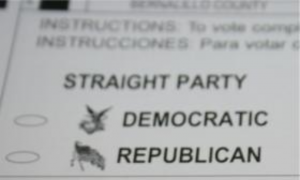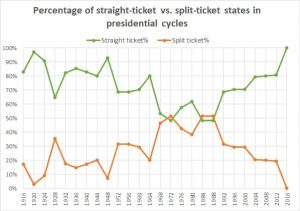Straight-Ticket Voting: Helpful or Harmful?
Chapter 10 discusses the ideas of citizen participation through voting, campaigns, and elections. Voting gives citizens a voice, it is a guarantee that every citizen can express their beliefs about policies affecting the future of our country. In particular, it discusses the importance of having high rates of varying population groups participating in voting in order for elections to truly be considered democratic.
New Mexico’s Secretary of State Maggie Toulouse Oliver recently promised to reinstate straight-ticket voting in her state. Straight-ticket voting is a modification to election ballots in which there is an option that allows voters to vote for their entire party’s political candidates without having to go through and individually select each one. Supporters of straight-ticket voting claim that it simplifies the process by cutting down the long lines and busyness that ballots can present to voters. They also claim it increases voting participation as it ensures that citizens will not leave sections unmarked.
Source: http://www.wilx.com/home/headlines/Straight-Ticket-Voting-Could-End-In-Michigan-360415331.html
However, critics against straight-ticket voting claim that it is a ploy for the majority party, in New Mexico’s case the Democratic party, to stay in control. GOP Executive Director Ryan Gleason said “Straight ticket voting is an underhanded and potentially illegal power grab by an elected official who is supposed to referee partisan battles, not lead the charge.” He viewed this move by Secretary of State Toulouse as a political strategy to ensure her party’s dominance, “Democrats are pursuing monolithic one-party control of every elected office in New Mexico and will openly undermine our democracy to get it.” He believes that by Toulouse promising to reinstate straight-ticket ballots she is appealing solely to the Democrats in her state. While this is motivating and an incentive for them to participate in voting, the message can leave members of other parties feeling alienated, overpowered, and unheard.
I believe that straight-ticket voting is detrimental to our democratic voting process. Among being a political strategy for some leaders to appeal to their party members, it poses many other problems that undermine the purpose of voting. For one thing, straight-ticket voting fuels the political divide that has been an increasing trend in our country’s political atmosphere. It creates an incentive for people not to vote based on what their beliefs on specific policies affecting their community are, but instead purely based on their political party. Chris Cillizza, a journalist for “The Fix,” a politics blog for the Washington Post expressed his worry about straight-ticket ballots, “It suggests we have become increasingly tribal in the way we think about elections. You are either with ‘us’ (whoever that ‘us’ may be) or against us. There’s no room for a candidate-by-candidate assessment up and down the ballot.” Straight-ticket ballots eliminate any incentive for citizens to research the candidates running, what their platforms are, their policies, their past history, etc. Straight-ticket ballots ensure that no one will have to be educated on the problems posed in their community and what leaders they believe would be best to help them, which leads to a decrease in citizen’s political participation as well as personal investments in their community.
Straight-ticket voting is gaining popularity in our country’s politically divided climate. A 2013 survey stated that in North Carolina where straight-ticket ballots are used, “the Raleigh-based Democratic-leaning firm Public Policy Polling found 68 percent support for straight-ticket voting and 21 percent opposition. PPP found Democrats and Republicans supported it almost identically.” However, as straight-ticket ballots move towards the norm, I cannot help but worry that this will lead to our country becoming further polarized and lead to less involved and educated citizens participating in voting. As chapter 10 states “Even fiercer partisanship, moreover, increasingly is keeping candidates from choosing policies that reflect the wishes of the median voter in the electoral competition model, making this democracy-enhancing electoral mechanism less effective.” If we continue on this path of division in our country, we will continue to undermine the democratic voting system’s purpose and leave many citizen’s voices unheard.
Source: (Sabato’s Crystal Ball, University of Virginia)
Sources:
https://www.abqjournal.com/1150042/straight-party-voting-may-return-to-new-mexico.html
http://www.newsobserver.com/news/politics-government/election/article95286262.html
https://www.brennancenter.org/blog/how-bad-north-carolina’s-ballot-flaw-numbers-say-pretty-bad